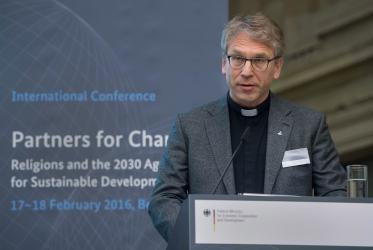Displaying 1 - 17 of 17
11 - 13 February 2021
Fr Alexi - a peacemaker in Syria
21 December 2018
A moment in ‘Time’: an interreligious vision in Erlangen
20 December 2018
Romani people seek “lives of decency, dignity, and justice”
27 September 2018
G20 summit: call to pray for peace in Hamburg
07 July 2017
WCC general secretary speaks on religion and discrimination
14 February 2017
Panel discussion fields ideas on European identity
26 April 2016
Symposium focuses on religion, violence, extremism
04 February 2016










